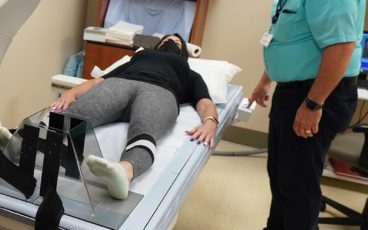Although orthopedists and rheumatologists both focus on a patient’s joints, muscles and bones, rheumatologists focus more on joint disorders that can be treated medically while orthopedists specialize in surgical treatments and managing fractures. To help improve patients’ access to care and to ensure they get the best treatment possible, many orthopedic practices have expanded to include rheumatology services.
The Difference Between a Rheumatologist and an Orthopedist
When suffering from debilitating joint pain, it can be confusing for patients to know whether they should schedule an appointment with a rheumatologist or an orthopedist. Typically, unless you have experienced a trauma to the body that requires a surgical treatment, you will want to schedule an appointment with a rheumatologist first. If caught early enough, a rheumatologist can use a variety of non-surgical treatment options, including medications, which can help with symptoms of inflammatory and systemic forms of arthritis.
Your rheumatologist will closely monitor your condition and its progression while you are on medication or trying other non-surgical treatments. If your symptoms continue to persist, you will be referred to an orthopedic surgeon to see if your condition would be best treated with surgery. Review the lists below to determine which specialist would best suit your needs.
When to Visit an Orthopedist:
- If you are experiencing joint or musculoskeletal pain following an injury
- If you notice hip or knee pain that gradually increases when bearing weight
- If you suffer from severe joint pain that interferes with basic daily functions
- If you suffer from moderate or advanced arthritis in the hips or knees
- If you have had previous unsuccessful treatment of joint pain
- If you need a joint replacement
When to Visit a Rheumatologist:
- If you are experiencing pain that involves multiple joints
- If you notice new joint pain that is not associated with an injury
- If you suffer from joint or musculoskeletal pain associated with fever, fatigue, rash, morning stiffness or chest pain
- If you suffer from muscular pain with or without any other symptoms
- If you are over 50 and experience recurring headaches or muscle aches
- If you have noticed ongoing symptoms, such as unexplained fever, sweating or weight loss
Benefits of Collaboration Between Orthopedic Surgeons and Rheumatologists to Optimize Disease Management
For patients suffering from autoimmune conditions, such as rheumatoid arthritis or gout, a combined approach that focuses on both pharmacological and surgical procedures is often required for the optimum management of diseases.
Alfonso E. Bello, MD, MHS, FACP, FACR, DABPM, director of rheumatology research here at Illinois Bone & Joint Institute, has found that having rheumatologists and orthopedists in the same practice works well, because if the patient ends up visiting an orthopedic surgeon first when they could have benefited from seeing a rheumatologist, it is easy to transfer care to the right specialist.
“Many times, patients are seen by orthopedic surgeons as their first musculoskeletal specialist when, in fact, they may be better served by a rheumatologist,” he says. “My orthopedic partners are well equipped to identify patients with rheumatologic disorders and facilitate transfer of care to me—thereby accelerating proper care.”
When orthopedic surgeons and rheumatologists work under the same roof, it is easy to establish relationships with one another. This is extremely helpful because if a rheumatologist needs to refer a patient to an orthopedic surgeon, he or she can communicate with his or her colleague, helping the patient receive the best possible care. In addition, sharing a location can help provide convenient and well-rounded comprehensive care to patients who need to see both a rheumatologist and an orthopedist. Dr. Bello believes that the combination of these two specialties will be the wave of the future.
Schedule Your Visit with a Rheumatologist or Orthopedist in Illinois Today
Whether you’re in need of a surgical or non-surgical treatment option for your joint disorder, the physicians at Illinois Bone & Joint Institute can help improve your quality of life. We have many locations throughout Illinois for your convenience. Not sure which specialist you should schedule your appointment with? Contact us today and we will recommend who we believe the best physician is to suit your needs.




